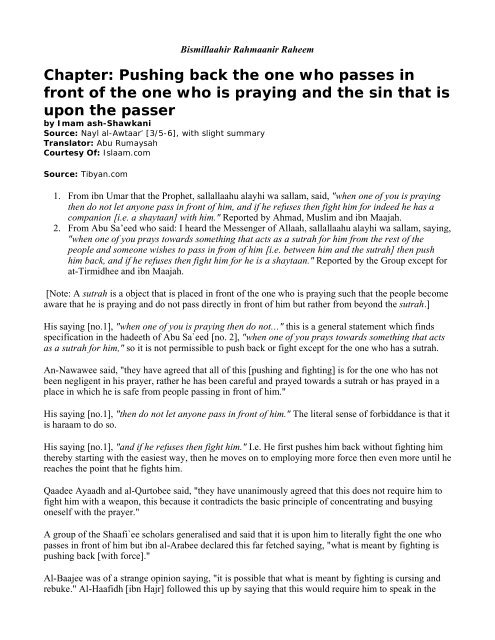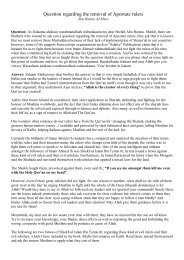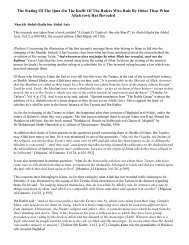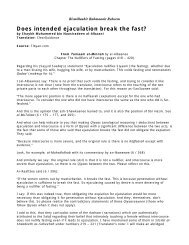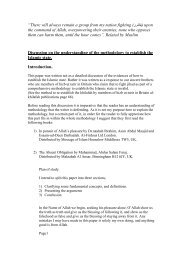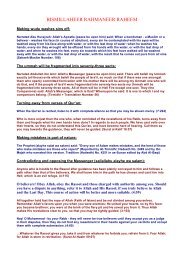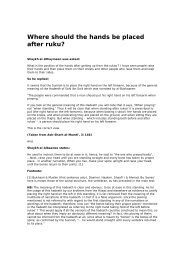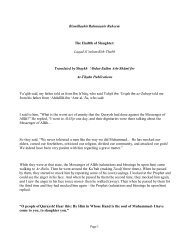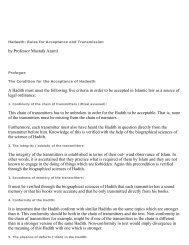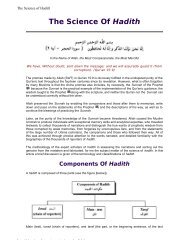Chapter: Pushing back the one who passes in front of ... - Hoor al-Ayn
Chapter: Pushing back the one who passes in front of ... - Hoor al-Ayn
Chapter: Pushing back the one who passes in front of ... - Hoor al-Ayn
Create successful ePaper yourself
Turn your PDF publications into a flip-book with our unique Google optimized e-Paper software.
Bismillaahir Rahmaanir Raheem<br />
<strong>Chapter</strong>: <strong>Push<strong>in</strong>g</strong> <strong>back</strong> <strong>the</strong> <strong>one</strong> <strong>who</strong> <strong>passes</strong> <strong>in</strong><br />
<strong>front</strong> <strong>of</strong> <strong>the</strong> <strong>one</strong> <strong>who</strong> is pray<strong>in</strong>g and <strong>the</strong> s<strong>in</strong> that is<br />
upon <strong>the</strong> passer<br />
by Imam ash-Shawkani<br />
Source: Nayl <strong>al</strong>-Awtaar’ [3/5-6], with slight summary<br />
Translator: Abu Rumaysah<br />
Courtesy Of: Islaam.com<br />
Source: Tibyan.com<br />
1. From ibn Umar that <strong>the</strong> Prophet, s<strong>al</strong>l<strong>al</strong>laahu <strong>al</strong>ayhi wa s<strong>al</strong>lam, said, "when <strong>one</strong> <strong>of</strong> you is pray<strong>in</strong>g<br />
<strong>the</strong>n do not let any<strong>one</strong> pass <strong>in</strong> <strong>front</strong> <strong>of</strong> him, and if he refuses <strong>the</strong>n fight him for <strong>in</strong>deed he has a<br />
companion [i.e. a shaytaan] with him." Reported by Ahmad, Muslim and ibn Maajah.<br />
2. From Abu Sa’eed <strong>who</strong> said: I heard <strong>the</strong> Messenger <strong>of</strong> Allaah, s<strong>al</strong>l<strong>al</strong>laahu <strong>al</strong>ayhi wa s<strong>al</strong>lam, say<strong>in</strong>g,<br />
"when <strong>one</strong> <strong>of</strong> you prays towards someth<strong>in</strong>g that acts as a sutrah for him from <strong>the</strong> rest <strong>of</strong> <strong>the</strong><br />
people and some<strong>one</strong> wishes to pass <strong>in</strong> from <strong>of</strong> him [i.e. between him and <strong>the</strong> sutrah] <strong>the</strong>n push<br />
him <strong>back</strong>, and if he refuses <strong>the</strong>n fight him for he is a shaytaan." Reported by <strong>the</strong> Group except for<br />
at-Tirmidhee and ibn Maajah.<br />
[Note: A sutrah is a object that is placed <strong>in</strong> <strong>front</strong> <strong>of</strong> <strong>the</strong> <strong>one</strong> <strong>who</strong> is pray<strong>in</strong>g such that <strong>the</strong> people become<br />
aware that he is pray<strong>in</strong>g and do not pass directly <strong>in</strong> <strong>front</strong> <strong>of</strong> him but ra<strong>the</strong>r from beyond <strong>the</strong> sutrah.]<br />
His say<strong>in</strong>g [no.1], "when <strong>one</strong> <strong>of</strong> you is pray<strong>in</strong>g <strong>the</strong>n do not…" this is a gener<strong>al</strong> statement which f<strong>in</strong>ds<br />
specification <strong>in</strong> <strong>the</strong> hadeeth <strong>of</strong> Abu Sa`eed [no. 2], "when <strong>one</strong> <strong>of</strong> you prays towards someth<strong>in</strong>g that acts<br />
as a sutrah for him," so it is not permissible to push <strong>back</strong> or fight except for <strong>the</strong> <strong>one</strong> <strong>who</strong> has a sutrah.<br />
An-Nawawee said, "<strong>the</strong>y have agreed that <strong>al</strong>l <strong>of</strong> this [push<strong>in</strong>g and fight<strong>in</strong>g] is for <strong>the</strong> <strong>one</strong> <strong>who</strong> has not<br />
been negligent <strong>in</strong> his prayer, ra<strong>the</strong>r he has been careful and prayed towards a sutrah or has prayed <strong>in</strong> a<br />
place <strong>in</strong> which he is safe from people pass<strong>in</strong>g <strong>in</strong> <strong>front</strong> <strong>of</strong> him."<br />
His say<strong>in</strong>g [no.1], "<strong>the</strong>n do not let any<strong>one</strong> pass <strong>in</strong> <strong>front</strong> <strong>of</strong> him." The liter<strong>al</strong> sense <strong>of</strong> forbiddance is that it<br />
is haraam to do so.<br />
His say<strong>in</strong>g [no.1], "and if he refuses <strong>the</strong>n fight him." I.e. He first pushes him <strong>back</strong> without fight<strong>in</strong>g him<br />
<strong>the</strong>reby start<strong>in</strong>g with <strong>the</strong> easiest way, <strong>the</strong>n he moves on to employ<strong>in</strong>g more force <strong>the</strong>n even more until he<br />
reaches <strong>the</strong> po<strong>in</strong>t that he fights him.<br />
Qaadee Ayaadh and <strong>al</strong>-Qurtobee said, "<strong>the</strong>y have unanimously agreed that this does not require him to<br />
fight him with a weapon, this because it contradicts <strong>the</strong> basic pr<strong>in</strong>ciple <strong>of</strong> concentrat<strong>in</strong>g and busy<strong>in</strong>g<br />
<strong>one</strong>self with <strong>the</strong> prayer."<br />
A group <strong>of</strong> <strong>the</strong> Shaafi`ee scholars gener<strong>al</strong>ised and said that it is upon him to liter<strong>al</strong>ly fight <strong>the</strong> <strong>one</strong> <strong>who</strong><br />
<strong>passes</strong> <strong>in</strong> <strong>front</strong> <strong>of</strong> him but ibn <strong>al</strong>-Arabee declared this far fetched say<strong>in</strong>g, "what is meant by fight<strong>in</strong>g is<br />
push<strong>in</strong>g <strong>back</strong> [with force]."<br />
Al-Baajee was <strong>of</strong> a strange op<strong>in</strong>ion say<strong>in</strong>g, "it is possible that what is meant by fight<strong>in</strong>g is curs<strong>in</strong>g and<br />
rebuke." Al-Haafidh [ibn Hajr] followed this up by say<strong>in</strong>g that this would require him to speak <strong>in</strong> <strong>the</strong>
prayer <strong>the</strong>reby <strong>in</strong>v<strong>al</strong>idat<strong>in</strong>g it which is not true <strong>of</strong> enact<strong>in</strong>g <strong>the</strong> easy matter [i.e. push<strong>in</strong>g <strong>back</strong>]. Al-<br />
Ismaa`eelee reported <strong>the</strong> hadeeth with <strong>the</strong> word<strong>in</strong>g, "and if he refuses <strong>the</strong>n place his hand on his chest<br />
and push him <strong>back</strong>," this is explicit that <strong>the</strong> push<strong>in</strong>g <strong>back</strong> is to be d<strong>one</strong> with <strong>the</strong> hand. This was d<strong>one</strong> by<br />
Abu Sa`eed to <strong>the</strong> slave <strong>who</strong> wished to pass <strong>in</strong> <strong>front</strong> <strong>of</strong> him – he pushed him <strong>back</strong> by push<strong>in</strong>g his chest –<br />
<strong>the</strong>n when <strong>the</strong> slave returned he pushed him <strong>back</strong> with more force as occurs <strong>in</strong> <strong>al</strong>-Bukhaaree and o<strong>the</strong>rs.<br />
Al-Bayhaqee quoted from ash-Shaafi`ee that "<strong>the</strong> mean<strong>in</strong>g <strong>of</strong> fight<strong>in</strong>g was to push <strong>back</strong> with more force<br />
than was employed on <strong>the</strong> first occasion."<br />
Qaadee Ayaadh said, "if he pushed him <strong>back</strong> <strong>in</strong> a permissible manner and caused his death <strong>the</strong>n <strong>the</strong>re is<br />
no retribution [qawad] aga<strong>in</strong>st him by agreement <strong>of</strong> <strong>the</strong> scholars but is blood m<strong>one</strong>y due upon him or<br />
not? There are two op<strong>in</strong>ions <strong>of</strong> <strong>the</strong> scholars concern<strong>in</strong>g this both <strong>of</strong> <strong>the</strong>se be<strong>in</strong>g voiced by <strong>the</strong> Ma<strong>al</strong>ikee<br />
scholars."<br />
Qaadee Ayaadh and ibn Batta<strong>al</strong> report a consensus that it is not permissible to w<strong>al</strong>k from <strong>one</strong>s place <strong>in</strong><br />
order to push <strong>back</strong> or to perform a great de<strong>al</strong> <strong>of</strong> movement and action <strong>in</strong> push<strong>in</strong>g <strong>back</strong>. This is because<br />
<strong>the</strong>se types <strong>of</strong> actions are more detriment<strong>al</strong> to <strong>the</strong> prayer <strong>the</strong>n hav<strong>in</strong>g some<strong>one</strong> w<strong>al</strong>k <strong>in</strong> <strong>front</strong> <strong>of</strong> you.<br />
An-Nawawee said, "I do not know <strong>of</strong> any <strong>of</strong> <strong>the</strong> leg<strong>al</strong> jurists <strong>who</strong> were <strong>of</strong> <strong>the</strong> op<strong>in</strong>ion that this push<strong>in</strong>g<br />
<strong>back</strong> was obligatory." Al-Haafidh followed this up by say<strong>in</strong>g that <strong>the</strong> Dhaahirees had explicitly stated<br />
that it was obligatory. The liter<strong>al</strong> sense <strong>of</strong> <strong>the</strong> hadeeth supports <strong>the</strong>m.<br />
His say<strong>in</strong>g [no.2], "for <strong>in</strong>deed he is a shaytaan." Al-Haafidh said, "apply<strong>in</strong>g <strong>the</strong> term shaytaan to <strong>the</strong><br />
human be<strong>in</strong>g <strong>who</strong> <strong>passes</strong> <strong>in</strong> <strong>front</strong> <strong>of</strong> <strong>the</strong> <strong>one</strong> pray<strong>in</strong>g is someth<strong>in</strong>g permissible for <strong>the</strong>ir occurs <strong>in</strong> <strong>the</strong><br />
Qur`aan <strong>the</strong> say<strong>in</strong>g <strong>of</strong> <strong>the</strong> Ex<strong>al</strong>ted, "<strong>the</strong> shaytaans <strong>of</strong> <strong>the</strong> humans and j<strong>in</strong>n." The reason for this<br />
application is that he has d<strong>one</strong> an action <strong>of</strong> Shaytaan. It is said that <strong>the</strong> mean<strong>in</strong>g is that it is Shaytaan<br />
<strong>who</strong> has <strong>in</strong>cited him to pass <strong>in</strong> <strong>front</strong> <strong>of</strong> <strong>the</strong> <strong>one</strong> <strong>who</strong> is pray<strong>in</strong>g and not go <strong>back</strong>. Ibn Batta<strong>al</strong> said: <strong>the</strong><br />
permissibility <strong>of</strong> apply<strong>in</strong>g <strong>the</strong> term shaytaan to <strong>the</strong> <strong>one</strong> <strong>who</strong> causes fitna <strong>in</strong> <strong>the</strong> religion can be derived<br />
from this hadeeth."<br />
Al-Haafidh said, "this is built upon <strong>the</strong> fact that <strong>the</strong> word shaytaan can be liter<strong>al</strong>ly applied to humans and<br />
figuratively applied to j<strong>in</strong>ns but such a premise requires <strong>in</strong>vestigation."<br />
It is <strong>al</strong>so said that <strong>the</strong> mean<strong>in</strong>g <strong>of</strong> Shaytaan is companion as occurs <strong>in</strong> <strong>the</strong> first hadeeth. Ibn Abee Jumrah<br />
derived from his say<strong>in</strong>g, "for <strong>in</strong>deed he is a shaytaan" that <strong>the</strong> mean<strong>in</strong>g <strong>of</strong> fight<strong>in</strong>g is to push <strong>back</strong><br />
gently and not to liter<strong>al</strong>ly fight, this because combat<strong>in</strong>g shaytaan is through seek<strong>in</strong>g refuge with Allaah<br />
and erect<strong>in</strong>g a barrier from him by mention<strong>in</strong>g <strong>the</strong> Name <strong>of</strong> Allaah and <strong>the</strong> likes. He went on to say, "so<br />
does <strong>the</strong> fight<strong>in</strong>g lie <strong>in</strong> fight<strong>in</strong>g <strong>the</strong> distraction that <strong>the</strong> <strong>one</strong> <strong>who</strong> is pray<strong>in</strong>g faces due to some<strong>one</strong> pass<strong>in</strong>g<br />
<strong>in</strong> <strong>front</strong> <strong>of</strong> him or does it lie <strong>in</strong> his try<strong>in</strong>g to bridle <strong>the</strong> s<strong>in</strong> <strong>of</strong> <strong>the</strong> <strong>one</strong> pass<strong>in</strong>g (by push<strong>in</strong>g him <strong>back</strong>)? The<br />
second option is more obvious."<br />
Al-Haafidh said, "o<strong>the</strong>rs said: ra<strong>the</strong>r <strong>the</strong> first is more obvious because <strong>the</strong> concentration <strong>of</strong> <strong>the</strong> <strong>one</strong><br />
pray<strong>in</strong>g takes precedence over his be<strong>in</strong>g concerned with bridl<strong>in</strong>g <strong>the</strong> s<strong>in</strong> <strong>of</strong> ano<strong>the</strong>r. Ibn Abee Shaybah<br />
reported from ibn Mas`ud that some<strong>one</strong> pass<strong>in</strong>g <strong>in</strong> <strong>front</strong> <strong>of</strong> <strong>the</strong> <strong>one</strong> pray<strong>in</strong>g severs h<strong>al</strong>f his prayer. Abu<br />
Nu`aym reported from Umar, ‘that if <strong>the</strong> people knew how much <strong>the</strong>ir prayer was dim<strong>in</strong>ished due to<br />
some<strong>one</strong> pass<strong>in</strong>g <strong>in</strong> <strong>front</strong> <strong>of</strong> <strong>the</strong>m <strong>the</strong>y would never cease to pray towards someth<strong>in</strong>g that would act as a<br />
sutrah from <strong>the</strong> rest <strong>of</strong> <strong>the</strong> people.’ So <strong>the</strong>se two narrations dictate that <strong>the</strong> push<strong>in</strong>g <strong>back</strong> is l<strong>in</strong>ked to <strong>the</strong><br />
distraction that <strong>the</strong> <strong>one</strong> pray<strong>in</strong>g faces and is not specified to <strong>the</strong> <strong>one</strong> pass<strong>in</strong>g. These two narrations even<br />
if <strong>the</strong>y end at a Sahaabah <strong>the</strong>y have <strong>the</strong> rul<strong>in</strong>g <strong>of</strong> be<strong>in</strong>g from <strong>the</strong> Messenger, s<strong>al</strong>l<strong>al</strong>laahu <strong>al</strong>ayhi wa<br />
s<strong>al</strong>laam, because <strong>the</strong> likes <strong>of</strong> this is not said from person<strong>al</strong> op<strong>in</strong>ion."


